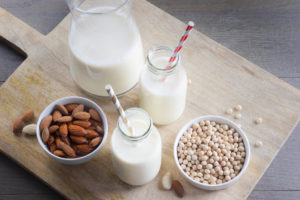 The winter isn’t a great time for your bones. Add that to the fact you may not enjoy or even tolerate dairy, and you could fall short on calcium.
The winter isn’t a great time for your bones. Add that to the fact you may not enjoy or even tolerate dairy, and you could fall short on calcium.
Thankfully, there are plenty of ways to get calcium without having to force down milk or yogurt.
Advertisement
You are likely manufacturing far less vitamin D this time of year. A trend probably to continue for the next five or six months as temperatures and sun exposure drop. Vitamin D is essential for absorbing calcium.
Aside from limited sunlight exposure, you’re likely not getting outdoors as much either. And when you are, you’re likely covered up. Not only does that impair vitamin D intake, but inactivity can promote weaker bones.
Dietary restrictions, low vitamin D, and inactivity can all put bone health at risk.
Vitamin D and activity are rather self-explanatory. Do your best to get up as frequently as possible throughout the day and dedicate at least 30-minutes per day to load-bearing exercise. Supplementing with up to 1,000 IU of vitamin D per day can also help.
But getting 1,000 – 1,200 milligrams (mg) of calcium per day may present a greater challenge. You don’t necessarily want to be supplementing heavily with calcium. Doing so may increase the risk of acid reflux, kidney disease, cardiovascular disease, prostate trouble, and hypercalcemia (high blood levels of calcium).
Finding suitable food options, in this case, is ideal. Some good non-dairy sources of calcium include:
- Chia seeds (can be mixed into yogurt or oats)
- Soy milk
- Almonds
- Dried figs
- White beans
- Sunflower seeds
- Broccoli
Advertisement
There are other nutritional options, including seasonal items like butternut squash and sweet potatoes. All of these sources feature relatively small amounts of calcium, but together they can provide a sufficient amount.
Eating calcium-fortified foods and supplementing with small doses (like what you’d get in a standard multivitamin) can help you top off daily totals.
If you can’t eat dairy, these are the foods that should be on your radar. Nature is working against your bones this season, so making sure you’re getting enough calcium, as well as vitamin D and exercise, can help keep bones healthy through the winter.
